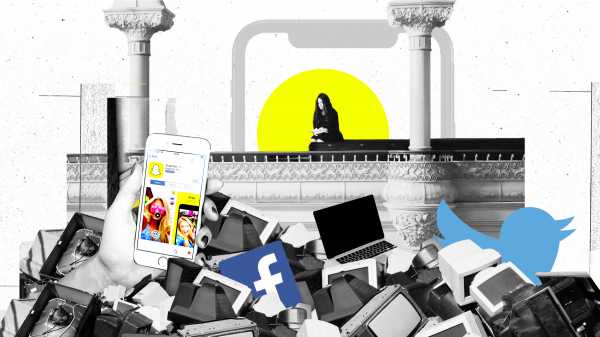 "” alt=”"How prayer helped me detox from the internet"” />
"” alt=”"How prayer helped me detox from the internet"” />
How prayer helped me detox from the internet
It’s become a necessary break from the digital churn.
By
Avital Chizhik-Goldschmidt
Updated
Jul 8, 2019, 9:18am EDT
Share
Tweet
Share
Share
How prayer helped me detox from the internet
tweet
share

I was raised to pray daily. Orthodox Judaism values routine above all — there are specific windows of time for morning, afternoon, and evening prayers, in order to ensure consistency. As a teenager and in my early 20s, I loved this ritual dearly. The practice gave my day structure, purpose, focus. Wherever I was, I could open my prayer book and create a sort of force field around me, swaying and confiding in God about my day, my fears, my hopes.
But before long, I grew up, and I found myself praying less and less. The demands of the daily New York City grind were too consuming: I became a rabbi’s wife, with all the communal obligations that role entails, and then had two babies in two years, while working full time throughout.
As a journalist working in American Jewish media in the era of Charlottesville and Pittsburgh, I am increasingly immersed in the daily churn of the news cycle. Practically, that means I’m on Twitter all day long, reading takes about awful events in order to turn it into content. At any given time, my inbox is full of hate mail from readers. When I’m commuting or cooking for the Sabbath, I’ll listen to podcasts about the state of the world, directly streaming the rage of the day into my ears.
More and more, it feels like life is becoming an indecipherable blur of keeping up with emails and tweets and pundits and Instagram curation. I’m a slave to my inbox, to my group texts and my need to be “up to date.” This takes time and mental space, and the first thing to go was my daily prayers. My phone quickly displaced my prayer book as daily reading, and though I had been raised to be idealistic, reverent even, I found myself increasingly cynical, angry. I explained it as part of the state of adulthood. My main priority right now is my family, my work, and my community, I would console myself. God understands.
But what I learned was that God wasn’t the one who needed my prayers. It was I who needed them more.
One spring evening, after a long day at work and finishing the bedtime routine with my children, I glanced at my phone and felt a wave of nausea. I had spent all day staring at a screen, scrolling through tweets and headlines, some hilarious, some dehumanizing, almost all of them angry. Was this really how I wanted to spend my evening? Craving to throw the device away, in the corner of my eye I noticed my siddur, my prayer book, the little white tome waiting for me patiently on my bookcase.
I purchased that prayer book five years ago, when I was single and dreaming of marriage. I murmured lines from it while riding the subway, while getting my wedding makeup done, while standing at the Western Wall, while waiting for that first ultrasound. I sat down, opened it, and felt the mayhem of modernity disappear. I could breathe again.
In my religious girls’ high school, prayer was a school subject — we were graded on attendance every morning, as hundreds of girls would stream into the assembly room, clutching their siddurs, some bored, some focused. In college, it was a marker of religious affiliation; if a student made time to pray, that meant she was truly religious.
But as an adult, as a millennial, as a working mother, making time to whisper ancient words has taken on a whole other nature. It feels like a radical act of resistance.
Prayer is the ability to say no to the demands of technology; to silence my devices, close my office door, and recite the afternoon service. It is a brief taste of Sabbath slipped into the frenzy of the day-to-day; it allows me to put everything aside and turn away from screens to paper. Liturgy offers guidance — it fills your lips with words, even when your heart has none. When you’re struck with writer’s block, the Psalms are there as a prompt.
In solitude, prayer allows for one’s mind to breathe, to explore the free expanse of one’s thoughts, with no glaring screen in front of me. In a communal service, it allows you to share an experience with flesh-and-blood human beings, without the separation of a screen, without the ability to mute them when they bother you.
It also centers my anger.
As I bow, lowering my head, I am reminded that the world is much greater than my own momentary rages.
As I read the words written thousands of years ago by ancient men, and then whispered by centuries of spice merchants and shtetl dwellers, aristocrats and ghetto residents alike, I wonder what their ordeals were, and realize that the bend of history is quite long, longer than any unanswered email or online controversy.
Prayer forces one to stop for a moment and wonder: What am I doing to actually improve this world? Do I embody the values in the words I am reciting? Do I comport myself with kindness and humility, with the knowledge that there is something greater than me?
The Hebrew word for prayer book, siddur, comes from the Hebrew word “seder,” which means “order” — because it offers a set order of regular prayers. But perhaps, more significantly, it is called siddur because the act of prayer offers order to the chaos of our lives. Rather than letting life slide by in an undefined haze, prayer punctuates our hours, our days, and our weeks. It is an exercise that consistently demands a revolutionary sort of intentionality.
“My God, open my lips,” the daily Amidah prayer begins.
It is this which reverberates through my mind before I pray, and afterward, when I close my prayer book and return to life.
Avital Chizhik-Goldschmidt is the life editor at the Forward. Find her on Twitter and Instagram.
Sourse: vox.com





